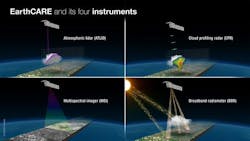EarthCARE space tech to study clouds and climate
FRIEDRICHSHAFEN, Germany - The Airbus-built EarthCARE climate monitoring satellite has been successfully launched from the Vandenberg Space Force Base in California. EarthCARE (Earth Cloud Aerosol and Radiation Explorer) is a joint undertaking between the European and Japanese space agencies ESA and JAXA. The satellite will examine the role clouds and aerosols (tiny atmospheric particles) play in reflecting solar radiation back into space as well as in trapping infrared radiation emitted from the Earth’s surface.
EarthCARE will circle Earth in a Sun-synchronous 400 km polar orbit crossing the equator in the early afternoon to optimize daylight conditions. The satellite will draw up vertical profiles of natural and human-made aerosols, register the distribution of water droplets and ice crystals and how they are transported in clouds, and provide essential input to improve the modeling of the warming climate and weather forecasting. Aerosols influence the life cycle of clouds, and contribute indirectly to how they give off radiation – measuring them will give a better understanding of Earth’s energy budget.
The spacecraft was developed, built and tested with the involvement of experts from 15 European countries as well as Japan and Canada, under the leadership of Airbus, in Friedrichshafen, Germany.
Related: Thaicom selects Airbus satellite as the company looks to expand telecom capacity
The Airbus-built atmospheric lidar ATLID is one of the four instruments on the EarthCARE satellite, providing vertical profiles of aerosols and thin clouds. ATLID is the second spaceborne ultraviolet lidar from Europe following Aeolus’, making Airbus a worldwide specialist in spaceborne lidars.
The satellite also includes a Broad-Band Radiometer developed by ESA through European industry, a Multi-Spectral Imager developed by Airbus’ subsidiary Surrey Satellite Technology Limited and a Cloud Profiling Radar developed by JAXA.
This combination of instruments will allow scientists for the first time to directly assess the role of clouds and aerosols on Earth’s radiation budget with one integrated satellite system thereby reducing current uncertainties.
